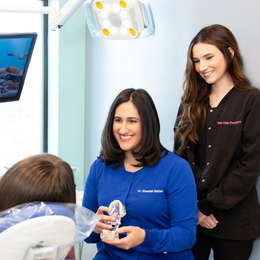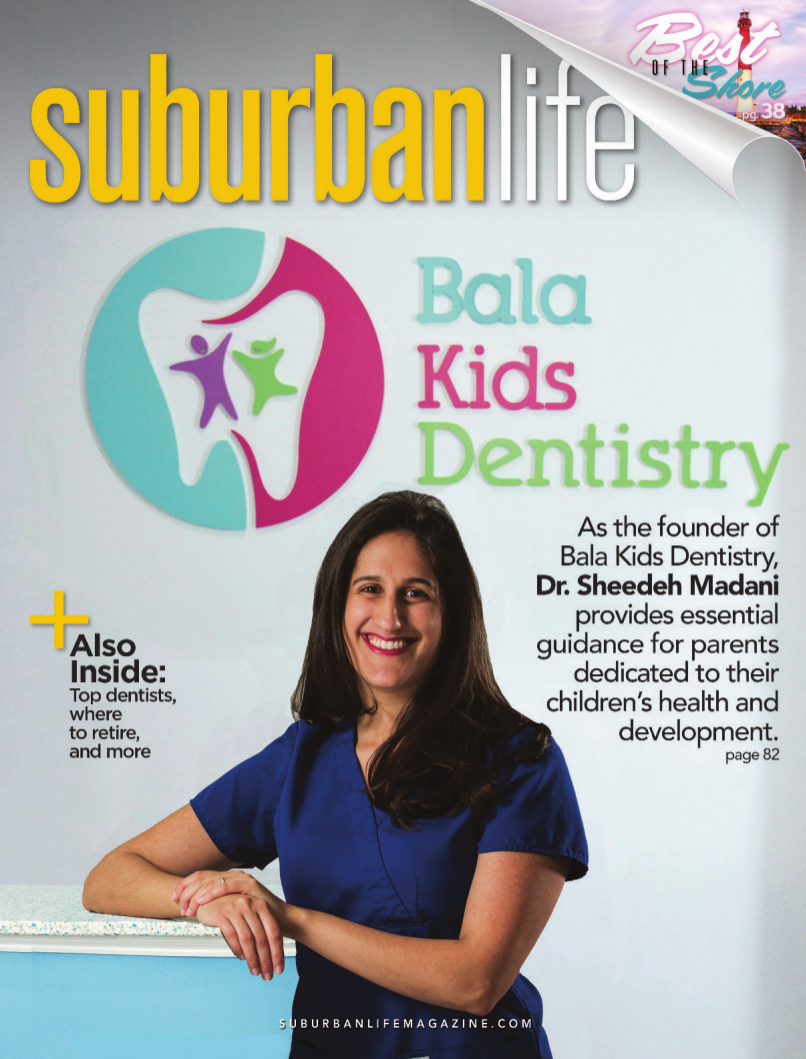
Building a Strong Foundation
As the founder of Bala Kids Dentistry, Dr. Sheedeh Madani provides essential guidance for parents dedicated to their children’s health and development
As with most things in life, good dental habits begin at a young age.
At Bala Kids Dentistry, board-certified pediatric dentist Sheedeh Madani, M.S., D.M.D., has built a practice that combines child-centered expertise with exceptional care to help kids develop healthy habits that carry into adulthood. The practice specializes in the care of infants, children, young adults, and patients with special needs.
As a mother to a young son of her own, Dr. Sheedeh understands the unique challenges that come with raising children. She says, “We care for the kids and their families as an extension of our own family.”
A career in pediatric dentistry was most appealing for Dr. Sheedeh. She grew up watching her parents build their careers in different aspects of dental health—her father, an oral surgeon; her mother, an oral medicine specialist and professor at the University of Pennsylvania School of Dental Medicine. She knew since her first job as a summer camp counselor for Friends’ Central School in Wynnewood that she enjoyed working with children.
At Bala Kids Dentistry, Dr. Sheedeh and fellow board-certified pediatric dentist Dustin Root, D.M.D., take a personalized, gentle, and comprehensive approach to treating patients. They emphasize cavity prevention and slowing down decay progression by using protective sealants and silver diamine fluoride. When dental issues do arise, however, her team combines their extensive training with meticulous preparation to deliver state-of-the-art care.
“We have worked hard to make this a fun and inviting environment for all patients, including those who have unique circumstances or specialized healthcare needs,” she says. “There are times when I’m sitting on the floor with a patient because that’s where they feel most comfortable. We also do desensitization appointments, where we do the exam to get kids comfortable with the experience and then bring them back a few months later for a formal cleaning.”
Dr. Sheedeh recently took the time to speak with us about some of the questions and concerns parents might have as it relates to a child’s dental health.
Q&A
When should a parent first bring their child in for a dental appointment?
The American Academy of Pediatric Dentistry recommends that children have their initial dental visit within six months after they get their first baby tooth or by the age of 12 months, whichever comes first. We understand the hesitation of bringing children in that young, because they may not tolerate sitting through an appointment. But this is expected and understood. It is important to establish a dental home for the children early, to help identify any problems with their oral health and review dental home care.
When should a parent first bring their child in for a dental appointment?
The American Academy of Pediatric Dentistry recommends that children have their initial dental visit within six months after they get their first baby tooth or by the age of 12 months, whichever comes first. We understand the hesitation of bringing children in that young, because they may not tolerate sitting through an appointment. But this is expected and understood. It is important to establish a dental home for the children early, to help identify any problems with their oral health and review dental home care.
What should a child expect for the first visit when they are a year old or younger?
At the first dental visit we typically do a “knee-to-knee lap exam,” during which the patient sits on their parent’s or caregiver’s lap through the exam. After the exam and cleaning, we discuss parent concerns, brushing techniques, cavity-prevention methods, and share information that will help with education and patient care. This can set the stage for a lifetime of good dental health.
At the first dental visit we typically do a “knee-to-knee lap exam,” during which the patient sits on their parent’s or caregiver’s lap through the exam. After the exam and cleaning, we discuss parent concerns, brushing techniques, cavity-prevention methods, and share information that will help with education and patient care. This can set the stage for a lifetime of good dental health.
Considering that baby teeth are meant to fall out, is it really essential for a child to see a pediatric dentist?
To ensure your child has good oral health, it is vital that you work to keep their baby teeth healthy. Baby teeth will also provide pathways for adult teeth to grow into. If a child’s baby teeth are neglected, they may experience many other problems such as infections that can spread to the rest of their body if not treated.
To ensure your child has good oral health, it is vital that you work to keep their baby teeth healthy. Baby teeth will also provide pathways for adult teeth to grow into. If a child’s baby teeth are neglected, they may experience many other problems such as infections that can spread to the rest of their body if not treated.
A child’s dental health is about much more than baby teeth. As part of our treatment, we conduct a thorough medical history, identify issues of weak enamel, early signs of decay, or pathologies in the gum or bone. Early care also includes screening for sleep apnea, throat obstructions, and tongue ties, and providing referrals. No matter the patient, my team and I want to help people advocate for their children through preventative care and early intervention.
What guidance can you provide for parents whose children have issues such as thumb sucking, a chipped tooth, or crooked teeth?
It is widely known that thumb sucking and the use of a pacifier can lead to children developing bite problems. As long as children stop by the age of three years old, their bite may self-correct. There are techniques that we can discuss with the parents to transition away from these habits. Since these habits are typically soothing for them, trying to find something that can be a replacement to soothe the children without affecting their bite can be beneficial.
It is widely known that thumb sucking and the use of a pacifier can lead to children developing bite problems. As long as children stop by the age of three years old, their bite may self-correct. There are techniques that we can discuss with the parents to transition away from these habits. Since these habits are typically soothing for them, trying to find something that can be a replacement to soothe the children without affecting their bite can be beneficial.
If your child has chipped a tooth, we’d advise that you schedule a visit with us as soon as possible so that we can evaluate the severity of the chip or fracture. An X-ray may be needed to evaluate if there is any nerve exposure or root fracture. The treatment depends on the extent of the dental trauma, the patient’s age, cooperation, and whether the fracture is on a baby or adult tooth.
The primary cause of crooked teeth in adults is due to overcrowding in the mouth. We can anticipate this before the adult teeth fully come through in children. A palate expander can be introduced early to make room for overcrowding teeth.
Is there anything else you would want parents to know?
When choosing a dentist for your child, look for a board-certified pediatric dentist. They will have additional training and years of experience working with children. Beyond their credentials, parents should look for someone they feel comfortable with and can form a bond with, because this is someone who’s going to be in your life—and in your child’s life—for a long time.
When choosing a dentist for your child, look for a board-certified pediatric dentist. They will have additional training and years of experience working with children. Beyond their credentials, parents should look for someone they feel comfortable with and can form a bond with, because this is someone who’s going to be in your life—and in your child’s life—for a long time.
Our mission at Bala Kids Dentistry is to give kids a dental office experience where they feel at home and look forward to returning. Our goal is to instill a positive attitude toward dentistry in the minds of our young patients and their families that will last a lifetime.
About Dr. Sheedeh Madani
After receiving her undergraduate degree at the University of Pennsylvania, Dr. Sheedeh earned a Master’s in Biomedical Science at the Philadelphia College of Osteopathic Medicine. She returned to Penn for her dental doctorate, where she was awarded Certificates of Merit in both pediatric dentistry and oral medicine.
After receiving her undergraduate degree at the University of Pennsylvania, Dr. Sheedeh earned a Master’s in Biomedical Science at the Philadelphia College of Osteopathic Medicine. She returned to Penn for her dental doctorate, where she was awarded Certificates of Merit in both pediatric dentistry and oral medicine.
Her passion for working with children led her to specialize in pediatric dentistry at St. Christopher’s Hospital for Children in Philadelphia. The experience enabled her to collaborate with other medical providers as a model for comprehensive pediatric care, thereby providing a solid foundation when she founded Bala Kids Dentistry.
“The work we do is about much more than checking and treating children’s teeth,” she says. “We see the kids regularly through the year and throughout their childhood, so we are always on the lookout for any changes that need to be addressed with their pediatrician. We believe in the importance of communication between providers and reaching out to the patients’ pediatricians or specialists if it will benefit children’s overall wellbeing.”
Bala Kids Dentistry
15 Presidential Blvd., Suite 303
Bala Cynwyd, PA 19004
610-DENTIST (610-336-8478)
BalaKidsDentistry.com
15 Presidential Blvd., Suite 303
Bala Cynwyd, PA 19004
610-DENTIST (610-336-8478)
BalaKidsDentistry.com
Photo by Alison Dunlap
Published (and copyrighted) in Suburban Life magazine, June 2023.



